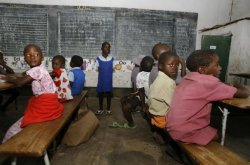One of the best celebrated statistics in Zimbabwe over the years since Independence in 1980 has been the high literacy rate largely as a result of the policy of providing basic education to every child up to Ordinary level (Form 4). The policy also ensured the construction of schools throughout the country and deliberate efforts were made to encourage adult learning. These gains are under threat, unfortunately, and it all has to do with the politics of contestation. RAU recently published a report documenting teachers’ experiences with election violence since 2000, with teachers reporting that they were subjected to targeted violence because they were perceived as sympathisers of opposition political parties.
The report revealed that schools were setup as militia bases, leading up to and during election periods, where teachers were summoned for various acts including assaults, being taught the liberation history of Zimbabwe, among others. Some of the military activities took place in front of children during working hours, where teachers were violated, humiliated and, in some cases, female teachers sexually abused. The message was clear for all children to warn their parents how “sell-outs” would be dealt with. And interestingly, some students became informants, keeping an eye on their teachers, who had to find survival strategies by way of fleeing the communities resulting in more than 94% of schools in the rural areas being closed at one point.

Zimbabwe is not in a state of war but the periods around elections, since 2000, frequently resembled a state of war, reminiscent of the liberation war, where villagers and communities would flee and schools would close. The United Nations Security Council in July 2011 unanimously adopted Resolution 1998 which affirmed other earlier resolutions on the protection of children in situations of armed conflict, declaring “schools and hospitals off limits for both armed groups and military activities, asking the Secretary-General for such crimes to be placed on a list of those committing “grave violations against children.” The text of Resolution 1998 expressed concern about attacks and the threat of attacks on schools and/or hospitals, including attacks on personnel in relation to them and the closure of the institutions in times of conflict and threat of attack.
As a member state of the United Nations, Zimbabwe must take positive steps to refrain from attacks on education and advance the rights of Children. The positive steps would be to take action and stop violence and the exposure of children to violence during times of elections. That commitment could also be demonstrated by putting in place legislation that prevents the use of schools for political purposes, because this practice exposes children to violence. The commitment would unite communities in defending the rights of children, especially girls. It would ensure that schools were safe zones for learning, especially in rural areas where the highest incidences of violence was recorded, and also that traditional leaders were not ZANU PF bootlickers who terrorise teachers because they are perceived to be opposition members.
Promoting the right to education is a sure sign that a country is investing in human capital. The concept of “Safe Schools” is incomplete without also ensuring that the personnel associated with education is safe. Through the Education Transitional Fund (ETF) the child text book ratio has improved but the political hindrances have also to be addressed, and this is the challenge Minister Coltart must address. We cannot afford to continuously have schools attain a zero percentage “pass rate” because schools were closed for the better part of the year and also because politicians use school facilities for electioneering.
If you would like to read our 2 reports written as a result of our teachers’ survey go to: http://www.researchandadvocacyunit.org
